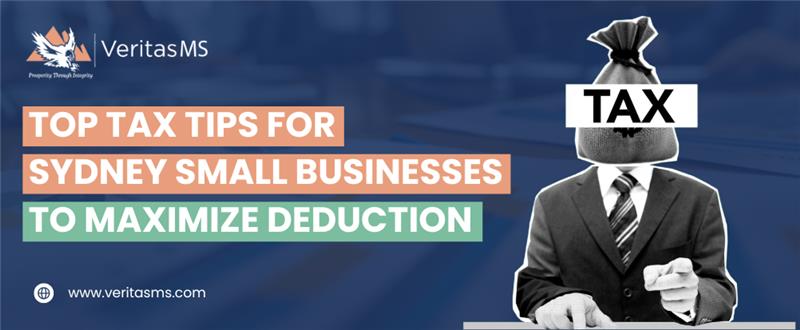Tax season can be a stressful time for small business owners, but with the right strategies, it’s an opportunity to save money and reinvest in your business. For small businesses in Sydney, understanding how to maximize deductions can make a significant difference to your bottom line. This guide provides practical tax tips to help you minimize your tax liability and keep your finances on track.
1. Keep Detailed Records of All Business Expenses
Accurate record-keeping is essential for claiming deductions. Make it a habit to track every business-related expense, from office supplies and utilities to travel costs. Use accounting software or mobile apps to categorize and store receipts digitally. With a well-organized system, you’ll be able to identify every eligible deduction and provide the necessary documentation to the Australian Tax Office (ATO) if required.
2. Understand What’s Deductible
Small businesses in Australia can claim a wide range of tax deductions, including:
- Office Supplies: This includes items like paper, ink, and other consumables used in your business.
- Utilities and Rent: If you lease an office, these expenses are deductible. For home-based businesses, you can claim a percentage of household costs.
- Travel Expenses: Any travel directly related to business activities, such as conferences, client meetings, or training, can be deducted.
- Employee Costs: Wages, benefits, and superannuation contributions are all tax-deductible.
Understanding the full scope of what you can claim helps ensure you’re not missing out on valuable deductions.
3. Take Advantage of Instant Asset Write-Offs
In Australia, the instant asset write-off scheme allows eligible businesses to claim immediate deductions for the cost of certain assets. This scheme applies to equipment, vehicles, technology, and other assets required to run your business. Before purchasing new assets, check the latest eligibility requirements and thresholds, as these can change based on government announcements.
4. Claim Vehicle Expenses for Business Use
If you use a vehicle for business purposes, you can claim deductions related to fuel, maintenance, and even depreciation. There are two main methods for claiming car expenses: the cents-per-kilometer method and the logbook method. Choose the method that best represents your usage to maximize your deduction. However, remember to keep a logbook or mileage records to ensure your claims are accurate and compliant with ATO guidelines.
5. Deduct Marketing and Advertising Costs
Marketing is essential for growth, and fortunately, most marketing and advertising expenses are deductible. This includes costs associated with social media ads, website development, promotional materials, and even sponsored events. By investing in your brand and then claiming those expenses as deductions, you’re helping your business grow while reducing your tax bill.
6. Utilize Superannuation Contributions
Contributing to your employees’ superannuation not only fulfills your legal obligations but can also help reduce your taxable income. Additionally, if you’re a sole trader or partner in a partnership, consider making personal super contributions. These contributions can often be claimed as a deduction, which helps you prepare for the future while lowering your tax liability.
7. Consider Home Office Deductions
If you operate from a home office, you’re eligible for home office deductions on certain expenses. You can claim a portion of your household bills, such as electricity, internet, and even a percentage of your rent or mortgage interest, based on the size of your workspace. Alternatively, you may opt for the ATO’s fixed rate per hour for simplicity.
8. Plan Ahead with a Tax Professional
A qualified tax professional can provide tailored advice based on the latest tax laws and regulations. Working with an expert ensures you’re not only claiming every eligible deduction but also avoiding costly mistakes. Accountants can help you with strategic planning, like setting up a more tax-efficient business structure or planning your expenses to align with tax regulations.
9. Take Advantage of the Small Business Income Tax Offset
Eligible small business owners in Australia may benefit from the Small Business Income Tax Offset, which provides a tax rebate for unincorporated businesses with an annual turnover below a certain threshold. This offset is designed to reduce the tax burden on small businesses, allowing you to retain more profits.
10. Consider Deferring Income and Prepaying Expenses
If you expect to have a higher income this year than next, consider deferring some income until the following tax year, where possible. Additionally, prepaying certain expenses before the end of the financial year can bring forward deductions, which can help reduce your current year’s taxable income. This tactic is often used to manage cash flow and reduce tax burdens effectively.
Maximize Your Tax Benefits with VeritasMS
Navigating tax obligations can be overwhelming, but by implementing these strategies, Sydney small businesses can minimize their tax liabilities and maximize their deductions. For expert assistance, VeritasMS offers tailored tax and bookkeeping services to help small businesses like yours thrive. Our team understands the unique challenges and opportunities facing Sydney entrepreneurs and can provide customized advice to ensure you’re getting the most out of your tax deductions.
Visit VeritasMS to learn more about our services and discover how we can help you optimize your finances for long-term success. Let VeritasMS take the stress out of tax season, so you can focus on growing your business.

